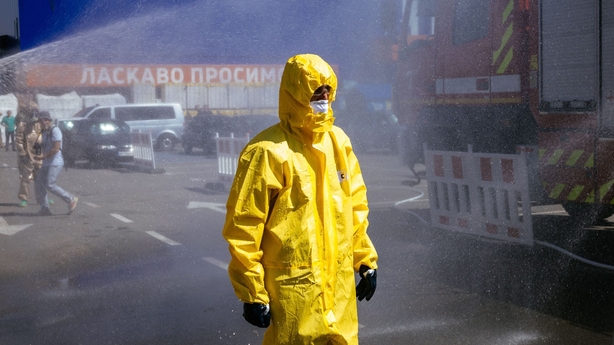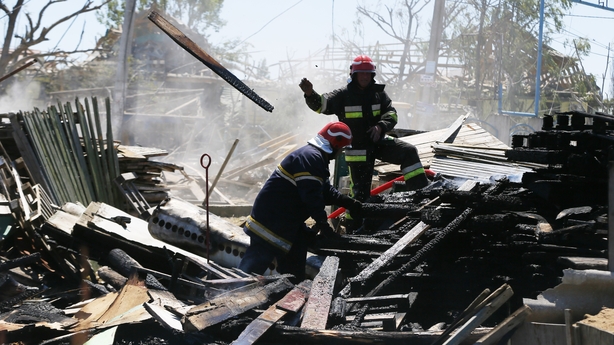Public celebrations have been banned in Ukraine's capital Kyiv this week to commemorate independence from Russian-dominated Soviet rule, local authorities said.
A curfew has also been declared in Ukraine's second city, Kharkiv, due to a heightened threat of Russian attack.
Near frontlines in the south of the country, Ukraine said Russia fired rockets into several southern Ukrainian towns north and west of Europe's largest nuclear power plant, captured by Russian forces shortly after they invaded Ukraine in February.
Artillery and rocket fire in the region of the Zaporizhzhia nuclear reactor complex, on the Russian-occupied south bank of the Dnipro River, has stirred fears of a nuclear disaster and led to calls for the surrounding area to be demilitarised.
Russia launched what it calls a "special military operation" on 24 February, claiming it aimed to demilitarise its smaller neighbour and protect Russian-speaking communities.
However Ukraine and its western backers accuse Russia of waging an imperial-style war of conquest.
Ukrainian President Volodymyr Zelensky warned at the weekend of the risk of more severe attacks ahead of Ukraine's 31st anniversary of independence from Soviet rule, which is this Wednesday.
Local authorities in Kyiv have banned large public events, rallies and other gatherings related to the anniversary in the capital until Thursday due to the possibility of rocket attacks, according to a document published by the Kyiv military administration and signed by its head Mykola Zhyrnov.
Read more:
Russian missiles shot down near Odesa overnight
Russian missile hits town near nuclear plant
Grain shipment from Ukraine arrives in Limerick
Ihor Terekhov, mayor of Kharkiv in the northeast which has come under frequent and deadly long-range Russian bombardment, extended a regular overnight curfew to run from 4pm to 7am effective from tomorrow until Thursday.
In the port city of Mykolaiv near Russian-occupied territory to the south, regional governor Vitaly Kim said authorities were preparing a precautionary order for residents to work from home tomorrow and Wednesday and urged people not to gather in large groups.
Mr Zelensky, in his nightly video address on Saturday, said Moscow could try "something particularly ugly" in the run-up to Wednesday, which also marks half a year since Russia invaded.
He said he had discussed "all the threats" with his French counterpart and word had also been sent to other leaders including Turkish President Tayyip Erdogan and UN Secretary-General Antonio Guterres.
"All of Ukraine's partners have been informed about what the terrorist state can prepare for this week," Mr Zelensky said in his nightly video address, referring to Russia.
The Financial Times, in an article published yesterday, quoted Gennady Gatilov, Moscow's ambassador to the United Nations in Geneva, as saying Mr Erdogan had tried to facilitate dialogue.
But he dismissed speculation about talks between Mr Zelensky and Russian President Vladimir Putin, saying there was no "practical platform for having this meeting", the report said.
Ukraine and Russia have traded blame for repeated incidents of shelling in and around the premises of the Zaporizhzhia nuclear reactor complex, on the Russian-occupied south bank of the Dnipro River, in recent weeks.

Kyiv has accused Moscow of basing troops and storing military equipment on the grounds of the power station and using it as a shield from which to bombard Ukrainian government-controlled territory to the west and north.
Russia denies this and accuses Ukraine of targeting the plant with shells and drones.
Overnight, Russian forces fired rockets into Nikopol, just across the Dnipro from the plant on its south bank, as well as the Krivyi Rih and Synelnykovskyi districts further out to the northwest and northeast respectively, regional Governor Valentyn Reznichenko wrote on Telegram.
Ukraine also reported a Russian missile strike on Voznesensk, to the southwest and not far from the country's second-largest atomic power station.
Yesterday, US President Joe Biden, British Prime Minister Boris Johnson, German Chancellor Olaf Scholz and Mr Macron held a phone call stressing the importance of ensuring the safety and security of Ukraine's nuclear installations.
They also welcomed recent discussions on enabling a mission by the UN nuclear watchdog agency to Zaporizhzhia, whiler eaffirming their "steadfast commitment" to support Ukraine in the face of Russia's invasion.
The conflict, Europe's biggest since World War II, has destroyed towns and cities, killed thousands of people and forced millions to flee abroad.
Since Ukraine repelled a Russian attempt to capture Kyiv early in the war, the fighting has been concentrated in the east and south where frontlines have been largely static for weeks.

In its morning update, Ukraine's General Staff said Russian forces had made incremental advances into the Blahodnatne area in the direction of Mykolaiv.
Russia was also trying to regain momentum towards Pisky, Bakhmut and Kramatorsk, key towns in Donetsk province which, along with neighbouring Luhansk, captured by Moscow's forces earlier in the summer, comprise the eastern Donbas region.
Russian artillery and multiple rocket launcher systems hammered the areas of Soledar, Zaytseve and Bilohorivka nea rBakhmut, the Ukrainian military command's update said.
At least two civilians were killed, the regional administration said. Russia denies targeting civilians.
Reuters was not able to independently verify the battlefield reports.
Civilian toll
The Office of the UN High Commissioner for Human Rights, citing its monitoring mission in Ukraine, said today that 5,587 civilians had been killed and 7,890 wounded between 24 February and 21 August, mainly from artillery, rocket and missile attacks.
UNICEF, the UN children's agency, said at least 972 children have been killed or injured over six months of war.
"The use of explosive weapons has caused most of the child casualties. These weapons do not discriminate between civilian and combatant, especially when used in populated areas as has been the case in Ukraine," the agency's executive director, Catherine Russell, said in a statement.
Separately, General Valeriy Zaluzhnyi - Kyiv's army chief -provided what appeared to be the first public Ukrainian military death toll, saying nearly 9,000 soldiers had died in action.
Russia has not said how many of its soldiers have been killed. Ukraine's General Staff have estimated the Russian military death toll at 45,400.
Reuters has been unable to verify military losses.
Meanwhile, in Russia, authorities are investigating a suspected car bomb attack outside Moscow that killed the daughter of ultra-nationalist Alexander Dugin, who advocates Russia absorbing Ukraine.
While investigators said they were considering "all versions" when it came to establishing who was responsible, the Russian Foreign Ministry speculated there could be a link to Ukraine, something a Zelensky adviser dismissed.
"Ukraine, of course, had nothing to do with this because we are not a criminal state, like the Russian Federation, and moreover we are not a terrorist state," Mykhailo Podolyak said on Ukrainian TV.

